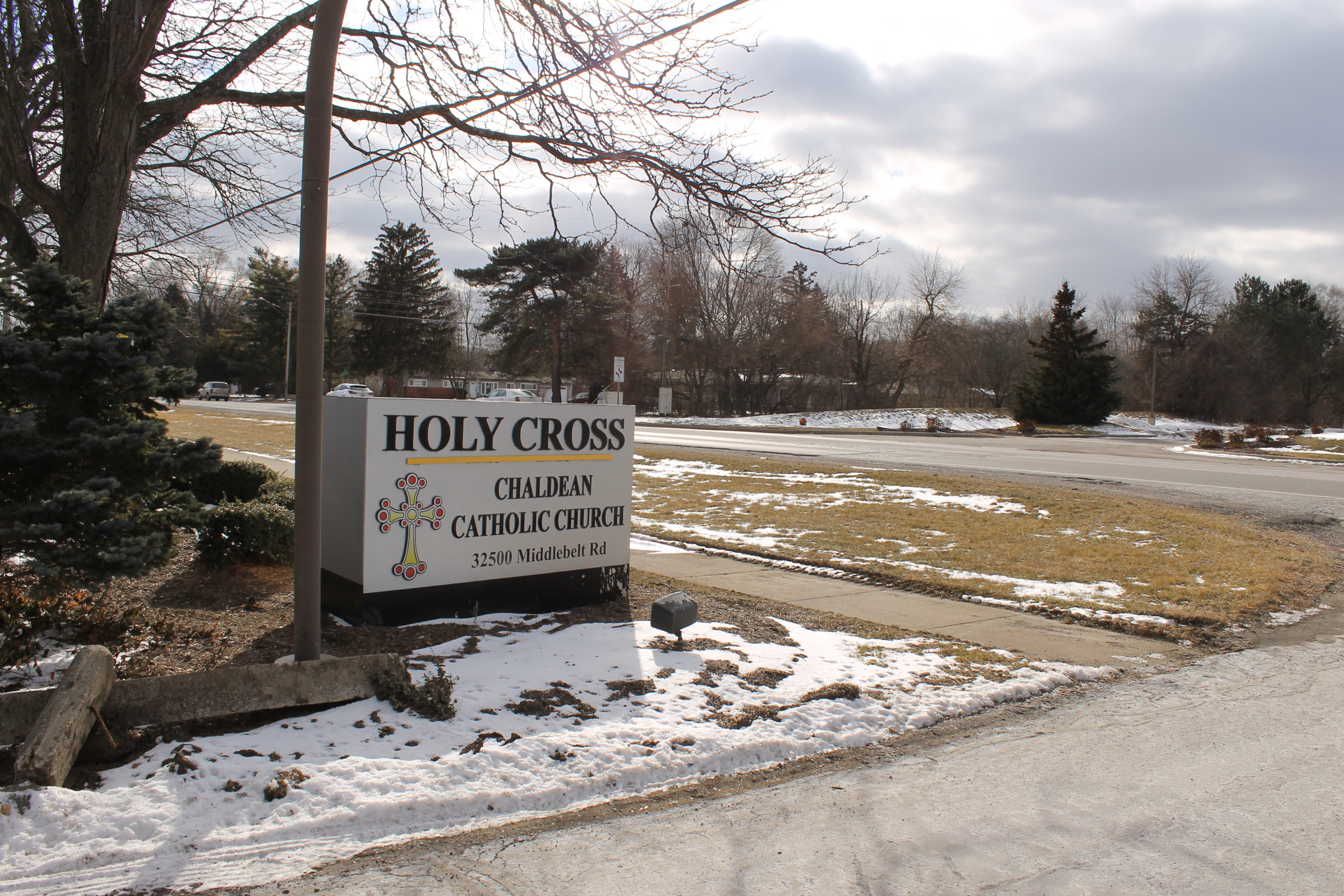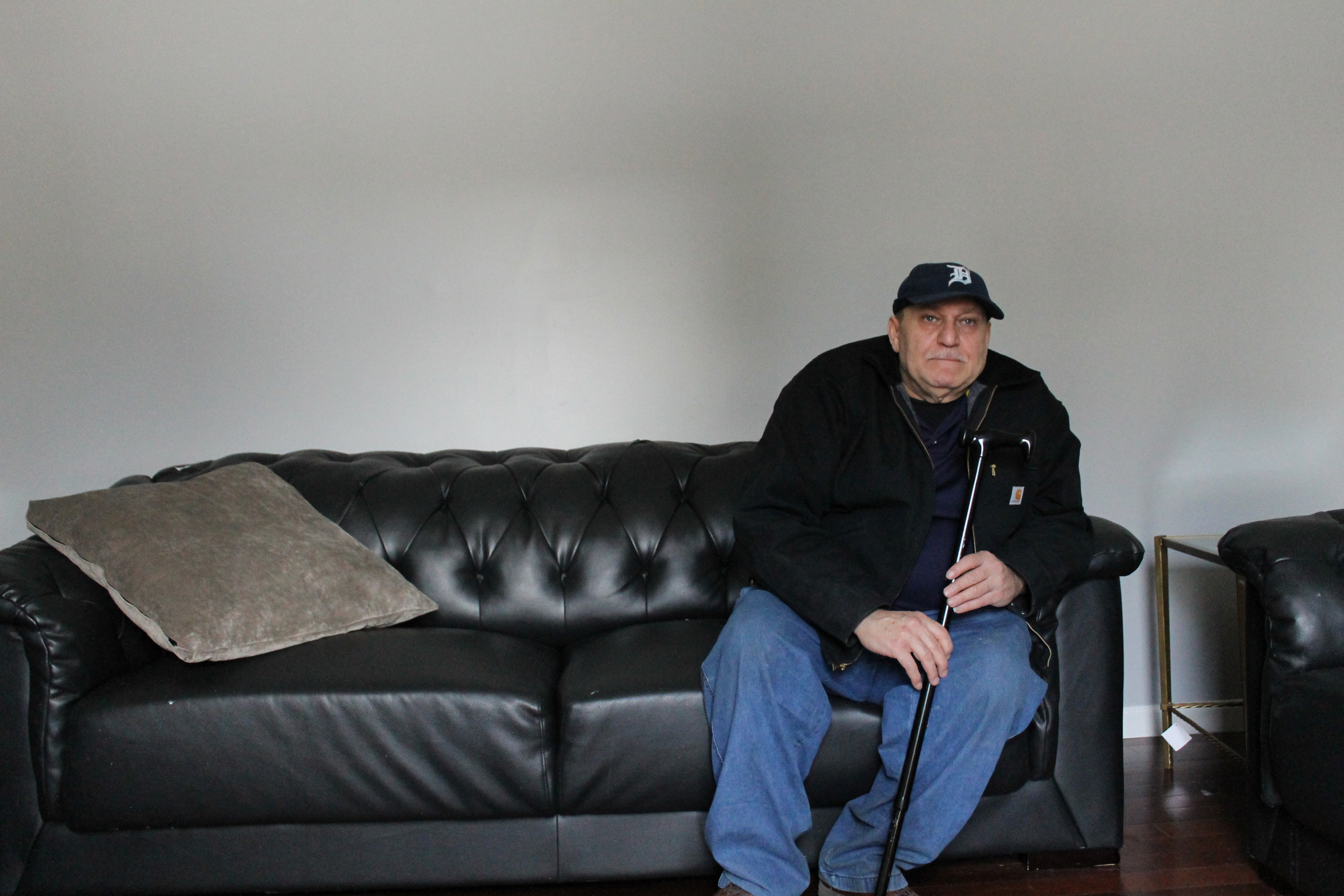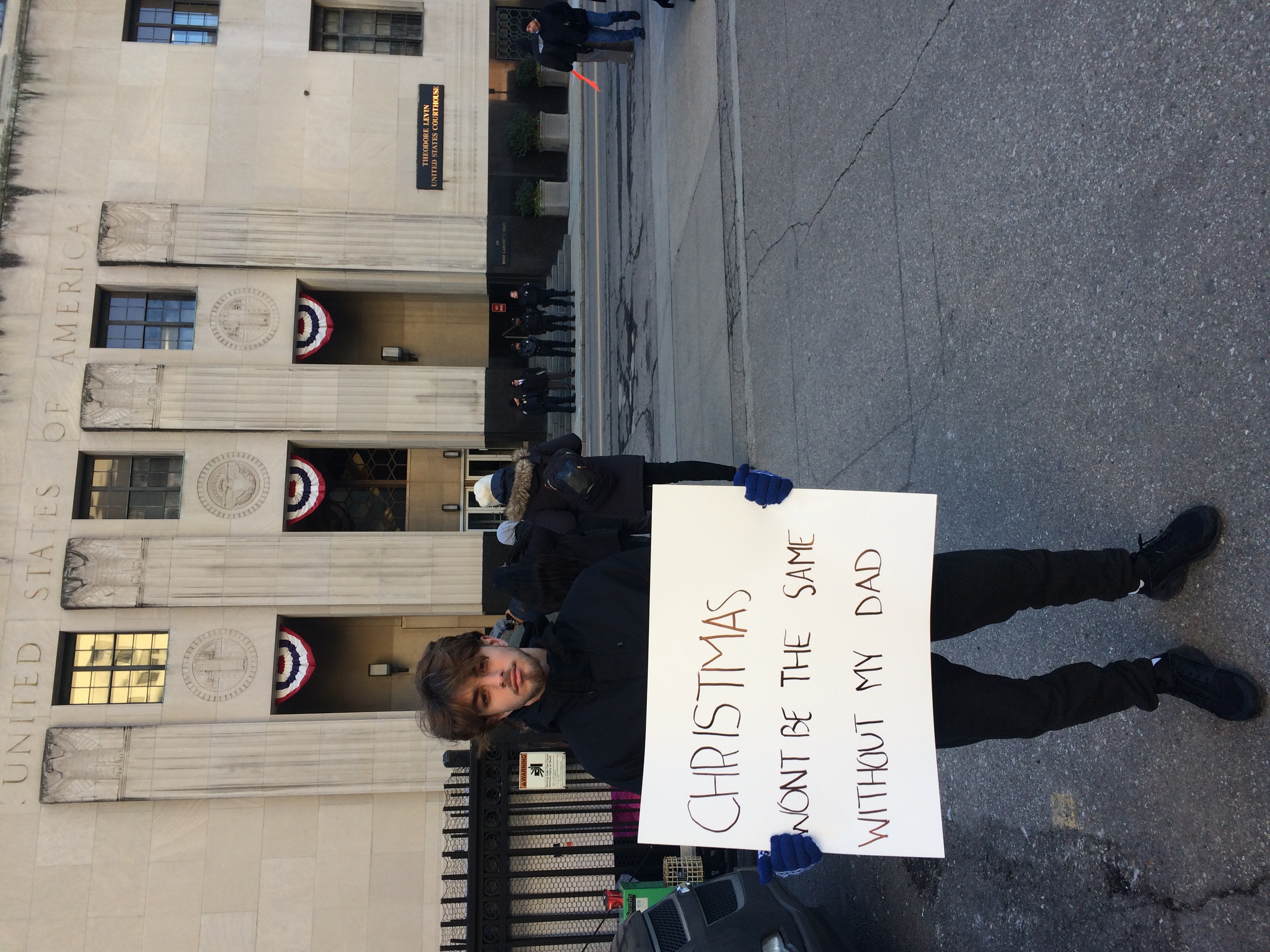DETROIT, MICHIGAN — At U.S. Immigration Court in Detroit’s McNamara Federal Building, the waiting room is full. It’s early January and most of those waiting are squeezed into winter coats, sitting in connected chairs making small talk in Spanish, Arabic, and English. Everyone had rushed to be present by 8:30 a.m. — braving icy roads and a long security line in the lobby downstairs.
When the clerk calls him forward, Attorney Ed Bajoka explains he has three paths to pursue in seeking release of his client, Mukhlis Murad, who’s been detained for nearly six months. Murad is a 59-year-old suburban grandfather with numerous health problems. His adult children and his sister are in the waiting room. When asked how it’s been at home without her dad there, his 23-year-old daughter, Summer, answers swiftly and directly, “He’s our best friend.”
Murad is one of several hundred Iraqi-born U.S. residents now facing detention and deportation. Many are married to U.S. citizens. Most speak English. At least half are Chaldean and speak Aramaic — not necessarily Arabic. They are parents and grandparents, business owners, and taxpayers. Many are churchgoing Catholics.
Late last spring, as President Donald Trump’s Muslim ban was being revised and reissued, Iraq was dropped from the list of countries in a deal Secretary of State Rex Tillerson called an example of “close cooperation” between the two governments. It seems, in return, Iraq would agree to repatriate Iraqi-Americans that the United States wanted to deport.
The Chaldean Catholic community of Detroit’s suburbs is heavily represented among the would-be deportees. Many believe the Christian Iraqis will be certain targets for torture, and even death, if they return.

Chaldeans are an ethnic and religious minority with indigenous roots in Northern Iraq; there are about 640,000 worldwide. Starting 40 years ago, thousands of Iraqi-born Christians fled religious persecution under Saddam Hussein, and about 120,000 Chaldeans have made homes in Southeast Michigan. In many cases, they settled into jobs operating corner stores as family businesses — as many of them had in Iraq because they were allowed to buy and sell alcohol, unlike Muslims. The Chaldean Chamber of Commerce says that today nine out of 10 food stores in the city of Detroit are owned by Chaldeans.
In Detroit, late night liquor and convenience stores are called party stores, and for decades Chaldeans have been a stalwart part of the local culture. Locals visit their usual party store a few times a week for beer or toiletries and often for a friendly conversation with the store’s Chaldean owner. As newcomers, Chaldeans took jobs others wouldn’t, working late hours in corner stores during perhaps the most dangerous time in Detroit’s history — the 1980s and ‘90s.
In 1997, Murad had jobs at two party stores, one during the day and one at night, at Teddy’s Medicine Chest. Around 9 p.m. one night in October 1997, five intruders entered that store in a robbery attempt. Murad was shot five times. The bullet that went into his jaw remains there, and his mental and emotional health hasn’t been the same since.

At his home in the Detroit suburb of Farmington Hills, Murad, who can’t work much, was cared for by his adult children. His daughter cooked. Every morning, his son shaved him because the left side of his face has been numb since the gunshot wound there 20 years ago. He used a cane to get around and helped look after his twin baby grandsons.
Murad came to the United States on a visitor’s visa in 1977, when he was 19. He got married, which adjusted his status to lawful permanent resident. Since his divorce 13 years ago, he’s been under an order of supervision and has complied, visiting the Immigration and Customs Enforcement (ICE) office whenever requested, about once per year. When he reported in July, he was interrogated about his immigration status and detained on the spot.
“Warehousing human beings”
In December at Battle Creek’s Calhoun County Jail, 115 miles west of his home in Farmington Hills, Murad was sitting in a wheelchair behind Plexiglass. He said canes aren’t allowed there, nor is Ativan, one of his prescriptions.
Detention is hard for Murad, and tears were rolling down his unshaven cheeks while he spoke. The jail is too far for his son to visit regularly. When Murad’s daughter Summer visits, he often tells the guards to turn her away. It is too upsetting for Murad when Summer leaves, which he avoids by not seeing her at all.
In 1983, Murad passed drugs to someone, for which he served jail time the same year. He said the practice of passing drugs in Detroit party stores in the 1980s was commonplace, and he had no understanding of the law. Making the sign of the cross over his head and heart, he said, “I swear to Jesus I did not know this about the USA.”
In U.S. District court in late December, the American Civil Liberties Union of Michigan argued before Judge Mark Goldsmith that detentions like Murad’s are unlawful. They conceded that some of the detainees have a criminal past, for which they’ve made amends appropriately, but say that indefinite detention and possible removal to Iraq is unconstitutional.
On January 2, Goldsmith issued an order declaring, “Our legal tradition rejects warehousing human beings while their legal rights are being determined,” and referenced, “… our nation’s historic commitment to individual human dignity — a core value that the Constitution protects by preserving liberty through the due process of law.”
Murad’s bond hearing on January 9 was the first since this order, with dozens more taking place over the next few weeks.

About 1,400 people are seemingly eligible for deportation since the changes to the Muslim ban, but most of those have not been detained — yet. Their attorneys guard their anonymity fiercely. Not all Iraqis with criminal backgrounds have been detained, while some who have been detained have no criminal background.
A particular betrayal
Jony Jarjiss, 58, is one of those people. He has been at Northeast Ohio Correctional Center in Youngstown, Ohio since July 11. Like Murad, he was scheduled for an ICE check-in and went voluntarily. He was detained for overstaying his visa and hasn’t been back to his home in Saginaw since.
The drive from Saginaw is five hours and $12 in tolls each way. His adult children and grandchildren, all four years old or younger, aren’t able to visit. He hasn’t even met his youngest grandchild, born six months ago, after he was sent away.
After his parents were killed in a 1991 Tikrit bombing, Jarjiss’ Chaldean family members arranged his marriage to an Iraqi woman living in the United States. They met once — in Jordan — and talked on the phone frequently. In 1993, he entered the United States on a so-called fiancé visa. The more he got to know her, the more his doubts expanded. After a big engagement party in Detroit and two in-person dates, he called it off. He was sorry to do it, but he wasn’t in love and couldn’t go through with it to please their families.
All these years later, Jarjiss spoke with tenderness about his family members. Across the partition and over the phone handset in Youngstown, he sang a few songs in Arabic; the lyrics were about God, women, and suffering. Of his four-year old grandson, he said, “I miss him the most of anyone or anything.”
When his engagement fell apart, he applied for, and was denied, asylum. By that point, between the Gulf War’s after effects and his knowledge of the violence in Iraq, he didn’t want to return. He moved to Saginaw, where his brother worked in a grocery store, in hopes of making a plan.
Before long, he was working at the store himself, and he’d fallen in love with a U.S. citizen who was mother to a five-week old daughter. He pledged to raise the girl and, later, became father to another daughter with the same woman. When their relationship ended and she had a third and fourth daughter with another man, Jarjiss pledged again to be the father figure in the lives of all four girls. His daughters are 22, 20, 15, and 13 years old. The relationship between Jarjiss and the woman was complicated and he refused to marry her, though she wanted to and it would have improved the situation of his immigration status.

The facility in Ohio has about 90 Iraqis alongside other criminal and immigration offenders. “It’s the United Nations in here,” Jarjiss said. Two of his fellow Iraqis chose voluntary deportation, rather than waiting this out in Youngstown.
In Iraq, years ago, Jarjiss was successful. He sang and played guitar. He said he was the number two track and field competitor in all of Iraq, and number one at the University of Mosul, where he studied linguistics and became fluent in English, Arabic, Aramaic, and Kurdish. “Iraq is not Iraq now,” he explained. He believes the threats to Chaldean Christians there are much more intense than when he left in the early ‘90s, and he has no family left there.
Torture, kidnapping, and suspicion of American sympathies are the norm for many Christians in Iraq, and deportees face even deeper suspicions and violence based on their American habits, their lack of remaining family in Iraq and because many of the detainees are not conversant in Arabic.
Daniel Wakefield Smith, an American researcher specializing in Iraq who’s lived there since 2007, traveled to Detroit in December 2017 to give testimony in an immigration case, saying “It is highly likely, and certainly more likely than not, that deportees will be tortured after they return to Iraq” either by Iraqi security forces or Iran-backed Shia militias. Smith’s expertise comes from hundreds of in-country interviews and from firsthand observations of arrests, interrogations, and occasions of torture. Aside from even the biases of Americanization and religion people like Jarjiss or Murad might face as deportees, Smith described torture in these situations as routine “because Iraq relies on a confession-based approach to investigation, interrogation, and separately, to prosecution.”
In addition to each individual immigration or criminal case that’s being fought by attorneys like Bajoka, the ACLU is spearheading a class action suit representing hundreds of Iraqi nationals. They say it’s inhumane to keep people in this prolonged state of detention, particularly because they have a good chance of winning their immigration cases eventually.
In the Chaldean community in Detroit, deporting these men feels like a particular betrayal given the Trump campaign’s apparent stance on protecting Middle Eastern Christians — and the Chaldean community’s subsequent support, thought to be a key part of how Trump narrowly won the typically blue state. Just after his inauguration, President Trump tweeted, “Christians in the Middle-East have been executed in large numbers. We cannot allow this horror to continue!”
Christians in the Middle-East have been executed in large numbers. We cannot allow this horror to continue!
— Donald J. Trump (@realDonaldTrump) January 29, 2017
Ron Kaplovtiz, an attorney representing several Iraqis with pending criminal cases, said there was an initial surge of sympathy for the Chaldeans among U.S. Christians.
“As soon as they found out [some] were criminals, they turned a blind eye,” he said. “I like to think I’m a spiritual person and I believe there should be second chances for people.” But after early enthusiastic support from church leaders, “It waned. And now it’s gone.”
“Everyone I saw was Chaldean”
After an evening in Youngstown, the road north toward Chardon, Ohio is twisting, hilly, and dark. It’s where Michigander, Nadir Jawad, 44, is serving time.
When Jawad came to the United States as a six-year-old in the early 1980s, he was issued a green card and made a lawful permanent resident, though his status was not clear by the time he was an adult. His father was pressured to join the Ba’ath party in Iraq in the late 1970s, resisted, and ultimately fled. As the youngest in his family, Jawad, whose name has been changed to protect his privacy, picked up English and assimilated so quickly that his cousins called him “white boy.”
At the jail in Chardon, Jawad spoke about growing up in the suburbs of Detroit, where he was a spelling bee winner and a high school wrestler. He enlisted in the U.S. Navy in his early twenties, but left a year before he would have been eligible to become a naturalized U.S. citizen. Had he known, he would have stayed.
In the mid-1990s, his sister, mother, and father took citizenship tests. He was young and felt too busy to study for the civics portion. He remembers flubbing the question about the songwriter’s name of The Star-Spangled Banner. He didn’t pass. In any case, the U.S. government hadn’t deported Iraqis for decades.
He may not have been a citizen, but he built a stable life and by 2013 lived in a condo and was working two jobs. There were missteps on his driving record, including more than one DUI. “I was so stupid,” he said.
He admitted he often drove after his license was suspended but felt he had no other choice; he had to keep working, and his job was for a flooring company, measuring people’s homes for linoleum and carpet. He couldn’t do that remotely, so he took his chances driving.
“We’re fighting for you, and we love you!”
In 2013, he was rushing to make it to work on time when his speeding car caught a police officer’s attention. The incident ultimately ended in a fleeing-and-eluding felony, for which he served time. He was released in 2014, and, like Murad and Jarjiss, was complying with the ICE schedule of check-ins.
On the early morning of June 11, 2017 Jawad was sleeping in his girlfriend’s home when he heard a loud knock. His girlfriend opened the door and ICE officers took Jawad to a van where there were other Iraqi men inside. They went to a few more houses and transferred to a larger van that held 15 people. Several such vans converged at the ICE office on Mt. Elliott Street in Detroit, where they were held for about 12 hours.
“I saw my cousin there. Two uncles. Everyone I saw was Chaldean,” Jawad said.
Later in the day, they started loading buses, and Jawad was on the fourth and final bus. Word had spread and there were protesters and family members lining the streets, threatening to lie down in the road to stop the buses. The bus jerked forward and stopped abruptly many times, avoiding people who were blocking it. A woman he’d never seen before was reaching her hand up to hold his hand, saying “We’re fighting for you, and we love you! I love you!” Then he was taken to Ohio.

A second chance
Bajoka said there’s a possibility that Iraqi nationals could be turned away by Iraq if they’re deported, referencing a recent incident in which an ICE-chartered plane left Minneapolis with about 90 Somalis, then turned around when it reached Dakar. His theory — that Somalia didn’t want to take them back — touches on some of the futility of the current situation. ICE chartered a plane in Detroit in the summer but it never took off, thanks to a July decision by Judge Goldsmith.
“No one has said Iraq will even accept them,” Bajoka said. “What’s the U.S. government’s interest in keeping them detained? If they were going to be deported, I get that. I get their goal. If they’re just sitting there, what’s the point?”
On January 31, Judge Alison Brown offered Jarjiss and Jawad a second chance. Jarjiss was released February 1, his 58th birthday, “on his own recognizance” without a bond payment. He said he’d pick up his life in Saginaw where he left off in July, though he’s lost his home and car due to missed payments. For Jawad, his second chance will commence once his family comes up with the $7,500 bond amount he was offered by Judge Brown.
In the small courtroom on the McNamara Building’s fourth floor on January 9, Summer Murad’s eyes were fixed on the video screen. On the other side of the video feed, Mukhlis Murad heard good news. If his family could come up with a $3,000 bond, he’d be released in time for his grandsons’ first birthday. “God bless you,” he told the judge, who explained he must comply with ICE orders of supervision. He answered, “I will. I will.”
The judge reminded Murad, “If you don’t appear, you will be deported.”
“God bless you,” Murad said again.


